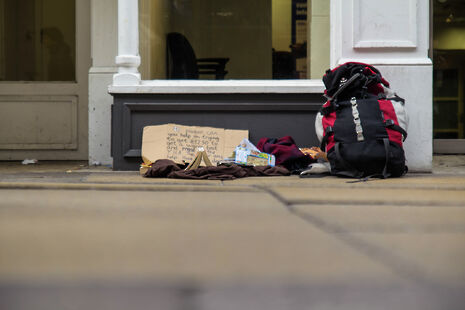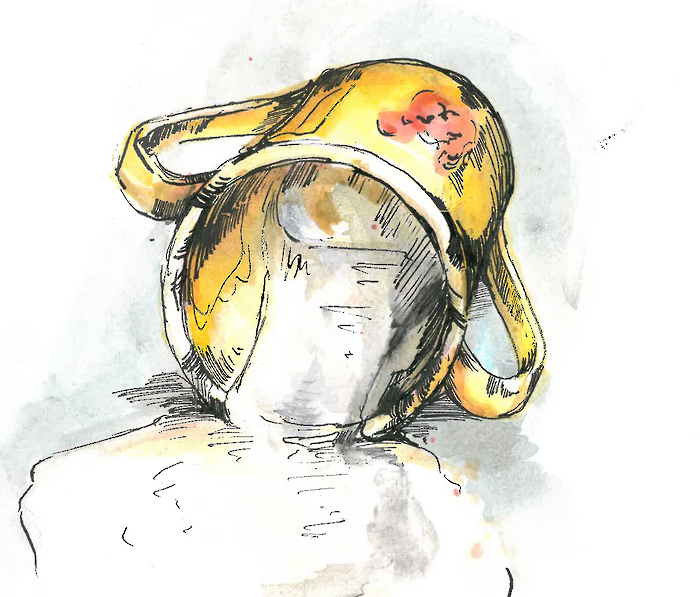‘Downhill, downhill, downhill’: The challenges of rough sleeping in Cambridge
Louis van-Boxel-Woolf speaks to local homeless people and volunteers about their experiences

Some names have been changed and some details obscured.
Nothing bursts the Cambridge bubble like being asked for change on a chilly evening. And that goes for residents as well as students. Looking back on starting work at Jimmy’s – a support service for Cambridge rough sleepers – Ros, now the Volunteer Coordinator, says “Boy, did I grow up”.
“What are you doing down there? Get up and do something”, was what she used to think upon seeing individuals on the street.
Now, she understands all the different reasons why people find themselves there. After all, as she notes, nobody grows up with the “ambition of rough-sleeping”. Engaging with the guests at Jimmy’s has been “a real eye-opener”. Barry, the Communications and Communities Officer at Jimmy’s, agrees.
There are many reasons why people become homeless, and why some of them can end up sleeping rough on the streets. “Austerity did cause a problem”, says Barry. “Rough sleeping has almost doubled since 2010” and the number of illegal evictions has risen dramatically, he notes. But “the top two reasons haven’t really changed: it’s always going to be relationship breakdown or family breakdown that generates the homelessness issue”.
That goes for Sam and Jenny, two people who sleep rough in central Cambridge. Sam, now 37, left home when he was 13 or 14 to get away from his abusive step father. At first he stayed over with friends, but the older he got the less help there was, from both his friends and from the authorities. Jenny had to leave an abusive partner two and a half years ago, and she has been on the streets since. Her three children have been adopted in the meantime.
But anybody can find themselves on the street, as Barry reminds me, and the process can be “very quick [...] One day I was a senior project manager at the Ministry of Defence, the next I’m on the streets, and you think, blimey, how does this work then?”. Chefs, authors, nurses and entrepreneurs have all stayed at Jimmy’s.
Ricardo, sleeping rough in central Cambridge, concurs. He personally used to work as a carer before falling out with his employers. They wanted him to spend no more than 45 minutes per house call, but he thought that “it shouldn’t be that way” for people who were “lonely”, and so he stuck around for a coffee and a cigarette. “I am the only person they see all day”, he says. After being made redundant, his employers refused to provide references, and he began sleeping in his car after being evicted from his home. After his car was seized he had to sleep on the streets. Things went “downhill, downhill, downhill”.
Getting off the streets is hard. It’s much harder to get a job without a fixed address, as Barry emphasises, and even then, work is no guarantee of a roof over your head. He cites the example of a postman who had to sleep in his van, and Sam says that he worked as a butcher but ended up back on the streets since it did not pay enough.
It seems that patience is a real necessary virtue here. Sam and Jenny are both on the council waiting list for housing, and on the waiting list for accommodation at Jimmy’s. But they have been waiting for a long time, and do not expect much to come of it. Back when she was sleeping in Bracknell, Jenny signed on for help there before travelling to Cambridge after months of waiting for a bed. They have been out all day when I speak to them, hoping to collect £17.50 worth of change, the price of a night at a youth hostel they know. But they expect to sleep out, Sundays normally being very ‘slow’ as Sam says. Ricardo agrees, but he, unlike the others, cannot join the council’s housing list because his ID has been stolen. Sam had to cobble the money together to buy one before he could join the waiting list.
Family is not always an easy option. Jenny grew up in care, Ricardo’s parents have recently died, and Sam’s mother is still with his abusive step-father. Sam speaks to his mother every few days on the phone, and I ask if his step-father might not have changed in twenty-odd years. “I don’t want to see if he’s changed or not” is the understandable reply. And it takes a lot to admit you need help in any case.
Coming through Jimmy’s door makes you a “hero” in Barry’s eyes. And he explains that the council only has a legal duty to house minors or those older than 55. Even those who have left abusive homes are legally classed as “intentionally homeless”. In this case the council “will be very sympathetic, don’t get me wrong” but it “has no duty to you whatsoever”. If you are not from Cambridge, the council also “has no duty to you whatsoever”.
Coping in the streets is hard. “It depresses me” to be homeless says Sam. I ask if he feels vulnerable. He has already told me that he collects medication from a surgery for his bipolar, but he is resolute: “You’re only vulnerable if you let yourself be”. During our conversation a policeman walks up to us. Sam suggests that he might be about to be moved on. He has already been fined and cautioned for begging – “I didn’t pay the fine”. Instead, the policeman shows him a picture of a man and asks if Sam has seen him. Sam recognises him as Andy, and lets the policeman know where he last saw him. The policeman wants to bring Andy to “a place of safety”. Andy has mental health issues, explains Sam, and he is “picked on” by others who take his things.
Forming relationships helps. Sam and Jenny have been together for eight months. Speaking to Ricardo, he gestures across the street towards “Ezra, a Russian kid. I am 49, he is 26. He is like my son. We stick together”. But no one sits with their significant other, since they say that passersby tend not to give change if they see that people on the street are not alone. “I don’t know why”, says Sam frustrated. And for this reason I am hurried on after finishing our chat.
The social aspect of Jimmy’s is crucial say Ros and Barry. “Coming into Jimmy’s and chatting” with staff and volunteers, says Ros, gives guests “the opportunity to open up more” and “build their self-esteem”. Both say that the guests enjoy talking to volunteers especially. They are delighted with the support Jimmy’s receives from the community, Ros praising the students who want to leave ’“the bubble” and “truly experience Cambridge”.
This social aspect can be brought onto the street. If you buy someone a sandwich, says Ros, do not forget that it “might be the fifteenth sandwich they’ve had that day”. “Very rarely”, says Barry, “do people go up and say: “Are you a vegetarian? A vegan? Is there anything you’re allergic to?” That’s a person, not a receptacle”. And “the act of stopping and saying hello, just engaging with another human being” can make all the difference to someone’s day.
 News / CUP announces funding scheme for under-represented academics19 December 2025
News / CUP announces funding scheme for under-represented academics19 December 2025 News / SU reluctantly registers controversial women’s soc18 December 2025
News / SU reluctantly registers controversial women’s soc18 December 2025 News / Cambridge welcomes UK rejoining the Erasmus scheme20 December 2025
News / Cambridge welcomes UK rejoining the Erasmus scheme20 December 2025 Features / Should I stay or should I go? Cambridge students and alumni reflect on how their memories stay with them15 December 2025
Features / Should I stay or should I go? Cambridge students and alumni reflect on how their memories stay with them15 December 2025 Film & TV / Timothée Chalamet and the era-fication of film marketing21 December 2025
Film & TV / Timothée Chalamet and the era-fication of film marketing21 December 2025










